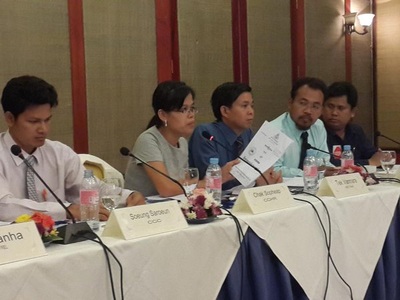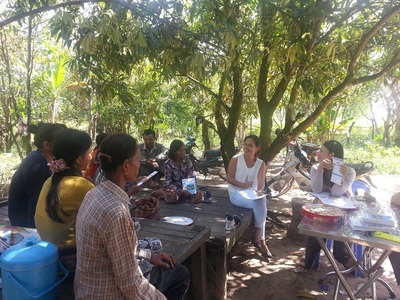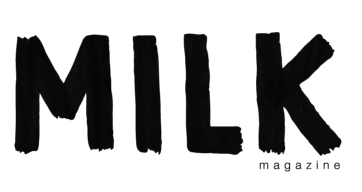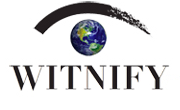| BANYAN BLOG |
banyan blog
"My current life feels special and uniquely mine because I get to be Cambodian-American in both Cambodia and America and I love how complete that makes me feel." 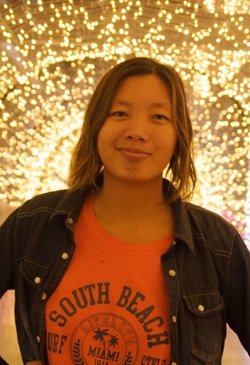 Caylee So, was born in Khao-I-Dang, a refugee camp along the Cambodia-Thai border in 1981. Like many families, Caylee and her family immigrated to the United States to find a better life soon after the fall of the Khmer Rouge regime. Settling down in Northern Virginia, she was a quiet child searching for a sense of place and belonging. At 18 she left home and joined the U.S. Army to explore a bigger world. Through that journey, she escaped the world around her by watching films, and by happenstance came across a compelling movie which sparked her interest in being a filmmaker. She is one of the Co-Founders of the successful Cambodia Town Film Festival which takes place in Long Beach, California every year (for the last four years). Through the festival, she hopes to keep the 2nd and 3rd generation of Khmer-Americans from losing their roots and embrace their dual identities. She is now in Cambodia filming "In the Life of Music" a film about the song “Champa Battambang" by the legendary Cambodian singer Sinn Sisamuth. Read about Caylee's remarkable journey from Khao-I-Dang, to Virginia, to Iraq, and finally back to Cambodia where she finds a completeness to her identity.
1 Comment
“It’s such an amazing chance to wear the flag of your country on you” 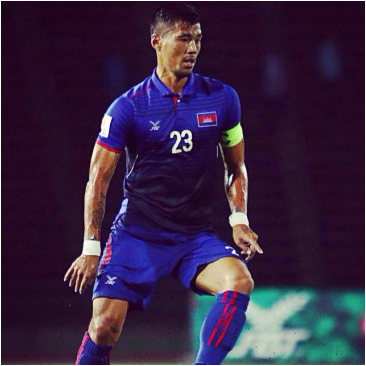 Photo courtesy of Theirry Chantha Bin Facebook Fan page. Photo courtesy of Theirry Chantha Bin Facebook Fan page. Thierry Chantha Bin was born in Ville Pinte France in 1991. Thierry’s parents left Cambodia during the war, but it was something they never really discussed at home. Growing up in the northeastern suburbs of Paris, Thierry was bullied because he was different and struggled in school. He credits his family, especially his mother for helping him through his difficult youth and teaching him important life lessons. Thierry discovered football at the age of 6 and focused his passion by finding inspiration through top athletes like David Beckham. He focused, worked hard and was eventually recruited to play as the Defensive Mid-Fielder for the Cambodian National Team (Phnom Penh Crown) in 2013. His proudest moment is “getting to play for the national team and singing the national song with fans.” Here is Thierry’s journey from the suburbs of Paris back to his homeland in Cambodia... This is the third edition of the popular Young Leaders Series. This series aims to inspire, motivate and tell a more positive story of Cambodia through the next generation of leaders. Too often we only hear about the problems plaguing Cambodia. This special series is dedicated to recognizing the intelligence, talent, creativity, innovation, and promise of Cambodia’s future. Each week in February and March through a series of interviews, I will profile a young leader, all under the age of 35, who is contributing to Cambodia’s development in various fields.
This third series focuses on Khmer diaspora who are coming back to Cambodia to make a difference. These are the children who were born in refugee camps after the fall of the Khmer Rouge or born in a country outside of their native homeland. Many grew up battling poverty, racism, identity crisis and a search for a sense of belonging. Yet, whether they expected it or not, pivotal moments in their lives brought them back to Cambodia. Whether they are temporarily or permanently living in Cambodia, they contribute in their own unique ways to their homeland. Through their stories, you will hear the other side of the Cambodian journey; from growing up oceans away, and overcoming their own struggles and triumphs; to coming back to playing an active role in helping to redefine Cambodia. While the challenges they faced may have been different than their counterparts, their resolve to overcome obstacles, drive for success, and desire to help build a better future for their country are the same. Whether they are Khmer-French, Khmer-American or Khmer-Canadian, their journey is part of the collective Cambodian experience and their contribution back to their native homeland is also important. In the run up to the 2016 Young Leaders Series, I caught up with a few of the 2015 Young Leaders. Here's what some of them were up to in 2015. Stay tuned for the upcoming 2016 Young Leaders group, soon to be published. Chak Sopheap, Executive Director, Cambodian Center for Human Rights, CCHR
Click here to read her 2015 Young Leaders Interview. Q: What were your biggest challenges in 2015? In 2015 I continued to encounter the trials of new leadership – we had the first ever organisational assessment at CCHR and used this as the foundation for our new strategic plan, which the existing strategy lasted by the end of 2015. I had to ensure the entire process was conducted in a transparent, participatory and accountable manner. As this was the first time we had ever completed such an assessment of the organization and a new wider consultative approach for strategy plan, it was a challenge to ensure we met the set goals within the given timeframe. At times it was stressful when things were delayed due to the demands of the participatory process, accommodating stakeholders' schedules, as well as consolidating much valuable input together. In addition, the deterioration of the human rights and political situation in 2015 pressed the organisation and its leadership to be proactive and balance its operations when unexpected advocacy efforts were required, such as the Stop and Consult campaign on the Law on Associations and Non-Governmental Organizations (LANGO), and when we needed to react to restrictions on fundamental freedoms. Q: What were your biggest accomplishments in 2015? Our organizational assessment was positive which proves that we are on the right track in terms of our actions and response to human rights concerns, and serving to the best of our ability our beneficiaries – affected communities - who are the reason for our work. A new and robust strategy has been defined, which will guide us for the next 5 years. Throughout the process, the openness we gained internally from our staff and stakeholders has enabled us to learn and get the most out of our Strengths, Weaknesses, Opportunities and Threats (SWOT) analysis. Q: What projects/activities will you be working on in 2016? CCHR has developed new core focus areas for programs in its Strategic Plan, which will inform key program areas for the next five years, and include protecting fundamental freedoms; judicial and legislative reform; equality and discrimination; business and human rights; and political participation, rights and reform. In addition to our existing projects, we have recently launched a new and innovative project – the Promoting and Protecting Digital Rights Project, which will focus exclusively on the protection of human rights in the digital context. Q: What are your hopes for 2016. My wish as always is to see Cambodians be able to enjoy the ability to exercise freely their rights so we can reach our full potential as a country. With our youths becoming increasingly active as agents of change, I have high hopes for Cambodia’s democratic future. |
FEATURED INMOST POPULARThe Journey Archives
October 2022
follow |
© banyan blog 2013-2022
All Rights Reserved
All Rights Reserved
